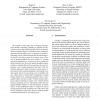Free Online Productivity Tools
i2Speak
i2Symbol
i2OCR
iTex2Img
iWeb2Print
iWeb2Shot
i2Type
iPdf2Split
iPdf2Merge
i2Bopomofo
i2Arabic
i2Style
i2Image
i2PDF
iLatex2Rtf
Sci2ools
108
click to vote
MDM
2004
Springer
2004
Springer
Processing Range-Monitoring Queries on Heterogeneous Mobile Objects
We consider in this paper how to leverage heterogeneous mobile computing capability for efficient processing of real-time range-monitoring queries. In our environment, each mobile object is associated with a resident domain and when an object moves, it monitors its spatial relationship with its resident domain and the monitoring areas inside it. An object reports its location to server whenever its movement affects any query results (i.e., crossing any query boundaries) or it moves out of its resident domain. In the first case, the server updates the affected query results accordingly while in the second case, the server determines a new resident domain for the object. This distributive approach is able to provide accurate query results and real-time monitoring updates with minimal location update and server processing costs. In addition, the new scheme allows a mobile object to negotiate a resident domain based on its computing capability. Thus, a more capable object can have a lar...
Related Content
| Added | 02 Jul 2010 |
| Updated | 02 Jul 2010 |
| Type | Conference |
| Year | 2004 |
| Where | MDM |
| Authors | Ying Cai, Kien A. Hua, Guohong Cao |
Comments (0)

